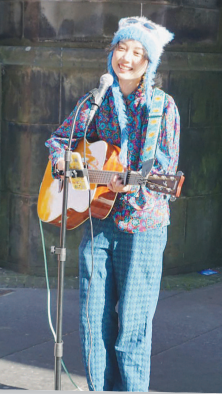Feeling the festival spirit
By Zheng Wanyin | China Daily Global | Updated: 2024-10-28 09:10

Festival Fringe entertain and educate, Zheng Wanyin reports in Edinburgh.
Many people have encouraged Lai Hongxi, a part-time Chinese folk singer and full-time student at the University of Edinburgh, to sing in English, but she always insists on using her mother tongue to compose and perform, even when busking in the United Kingdom.
"People have suggested I sing a few songs in English to attract more local audiences," she says. "They might be right from a commercial perspective, but it's more of my instinct to sing in my native language, just like babies are born with the instinct to suckle for food.
"When I read Chinese, I can feel that connection — an emotion that I don't experience with other languages. This somehow reflects the limitations of languages, as we might indeed be able to understand each other better if we all spoke the same one.
"But I believe in the universality of music in transcending boundaries. A few non-Chinese said they were also moved by my work, even though they don't necessarily get the lyrics. So, I guess, I should stay dedicated to composing in Chinese."
Lai is one of many artists who are eager to showcase their Chinese heritage at the Edinburgh Festival Fringe, one of the world's oldest and largest celebrations of arts and culture, which has been held every August, since its founding in 1947 as an unofficial of shoot of the Edinburgh International Festival.
This year's 25-day event featured more than 51,446 scheduled performances of 3,317 different shows from 58 countries.
Chinese folk songs might not be an art form as widely heard in the West as some of the traditional vehicles, such as kung fu, Peking Opera, or Chinese calligraphy. However, Lai's cultural background imbues her songs in a more nuanced way, which is reflected in the poetic, often reserved, and subtle lyrics.
In a song titled Jie Jie (Older Sisters), she writes: "Jie Jie, you have dark hair and calm eyes. Falling into your embrace, I now sleep the big sleep."
Jie Jie, here, does not refer to a biological older sister, Lai explains, but rather is a symbolic concept that personifies death.
"I don't want to treat death as a heavy thing, so I personify it as a female figure who gently stands at the endpoint of life to greet us," she says. "Everything will fade away one day, but let's not be afraid of the end. My mode of expression is more abstract."
























